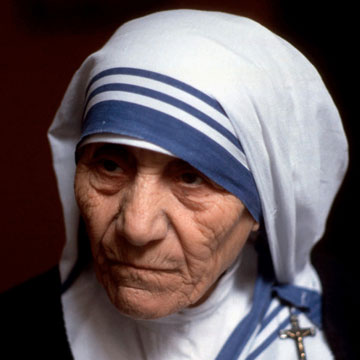 Peris:
Peris: Mother Teresa will be canonised on September 4, with the Vatican set to confirm details of the grand sainthood ceremony for the founder of the Missionaries of Charity and four others on March 15, sources said on Sunday.
A consistory, or formal meeting of Pope Francis with cardinals and church officials who promote sainthood causes, is expected to be held on Tuesday morning to finalise the sainthood ceremony, the sources in the Vatican said.
The event at the Vatican will be followed by a thanksgiving celebration in Kolkata on October 2.
There has been speculation for months about the final date, and the sources said they had been expecting it to be around September 5, the death anniversary of Mother Teresa.
Pope Francis had officially cleared the path to Mother Teresa’s sainthood on December 17 last year, when he recognised the “miraculous healing” of a Brazilian man whose multiple brain abscesses were cured after his wife prayed to Mother Teresa.
The beatification of Mother Teresa – another step towards declaring her a saint – took place after Pope John Paul II recognised the healing of an Indian woman with a stomach tumour and conferred on her the title of “Blessed” on October 19, 2003. More than 300,000 people had attended this event at St Peters Square in the Vatican.
A canonisation ceremony usually involves a special mass conducted by the Pope and is attended by huge crowds of believers. It is often held outdoors in St Peter’s Square, although sometimes the ceremony has been held in the home country of the person declared a saint.
The saint’s life history is read aloud and a large tapestry of the saint’s image is unfurled.
Sainthood is one of the highest honours granted by the Catholic Church through a long, complex and secretive process in which miracles are analysed theologically and medically before being attributed to a saint, the sources said.
Two miracles that take place after the death of the person have to be traced back to him or her. While healings are usually considered these days for sainthood, some of the other miracles the Church believes in range from “incorruptibility” (where the person’s body does not decay in the grave for a long time) to “levitation” during prayer and “stigmata” (the five wounds of Christ) that bleed during mass.
Mother Teresa née Agnes Gonxha Bojaxhiu was born on August 26, 1910 in Skopje, today the capital of Macedonia. She was the youngest of three children of an Albanian grocer named Nikola and his wife Drane. Her father died when she was eight.
Mother Teresa once famously said, “By blood I am Albanian. By citizenship, Indian. By faith I am a Catholic nun. As to my calling, I belong to the world.”
When she was 18, she left her family to join the missionary Sisters of Loreto in Ireland, where she got her name Mary Teresa. She first came to India in 1929 and moved to the slums.
In 1950, with the permission of the Vatican, she founded the Missionaries of Charity, a Roman Catholic religious order of women dedicated to “serving the poorest of the poor”. Mother Teresa won the Nobel Peace Prize in 1979.
The cost of beatification and canonisation reportedly runs into several hundreds of thousands of euros. On March 4, Pope Francis announced new regulations in a bid to keep the canonisation budget in check.
Vatican officials said the causes of the beatification and canonisation, due to their complexity, require a lot of work. This includes expenditure for the dissemination of knowledge of the person for the diocesan or eparchial inquiry, and celebrations of beatification and canonisation.
Loved by her admirers, missionary workers and volunteers for her work for the poor around the world, Mother Teresa also had her share of critics. In her Nobel speech, she said abortion was “the greatest destroyer of peace” and called it a “direct murder by the mother herself”.
Feminists around the world actively condemned her statement.
 Peris: Mother Teresa will be canonised on September 4, with the Vatican set to confirm details of the grand sainthood ceremony for the founder of the Missionaries of Charity and four others on March 15, sources said on Sunday.
Peris: Mother Teresa will be canonised on September 4, with the Vatican set to confirm details of the grand sainthood ceremony for the founder of the Missionaries of Charity and four others on March 15, sources said on Sunday.